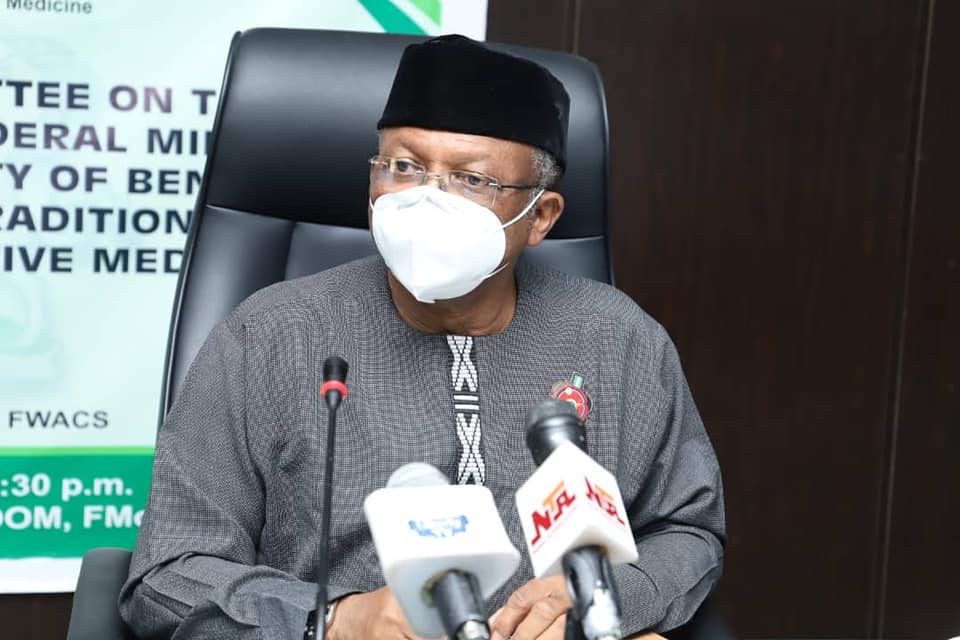Minister opposes bill to modify university hospitals
Health Minister Osagie Ehanire has expressed reservations about the Teaching Hospitals (UTH) Amendment Bill, which aims to restructure the composition of the board of directors of institutions.
Mr. Ehanire said this during the public hearing of a bill amending the UTH Act by the House Committee on Health Care Facilities in Abuja on Wednesday.
The Minister said that passing the bill would cause huge disruption in the health sector.
He added that this would aggravate the brain drain syndrome the country is experiencing and reduce the quality of health services in Nigeria.
"Rather than this bill, expertise should be focused on addressing the brain drain and improving hospital infrastructure," Ehanire said.
The Minister, represented by Adebimpe Adebiyi, the Director of Hospital Services, said UTH was a well-organized system under the Ministry of Health with a mandate on manpower training.
He said UTHs were primarily designed to train medical students, adding that the hospital's chief medical director was not only an administrator, but also had a responsibility to ensure compliance standards.
Meanwhile, the President of the Nigerian Medical Association (NMA), Uche Ojinmah, said the Association had rejected the bill in its entirety.
Mr. Ojinmah said the bill sought to defeat the purpose of enacting the law he sought to amend.

"It is important for us to know that unlike other government hospitals, UTHs, starting with UCH, Ibadan, were established primarily for the purpose of training medical students.
>"Before the promulgation of the main law, the CHUs were headed by directors of administration.
“It caused a lot of crisis because directors of administrations were more focused on financial results at the expense of training and research,” Mr. Ojinmah said.
He said the main act made the position of chief medical director a full-time position to be filled by someone with professional qualifications.
This, he says, should be similar to that of the Dean or Provost of Associated Medical Schools and with related health administrative experience.
According to him, the main act conferred control of teaching hospitals on the person whose primary area of competence as a duly registered physician and dental surgeon imbued him with knowledge.
This, he said, included legal status to take over patient management and training of medical student owners of the University Hospital.
He said the requirement in the Principal Act that a CMD must be a person who was a fully registered medical practitioner or dental surgeon was not a mistake.
Mr. Ojinmah explained that it was not the management of the teaching hospitals that was the problem, but the state of the nation.
Speaking earlier, Speaker of the House of Representatives Femi Gbajabiamila said the views of stakeholders for or against the topic would be taken into account.
He said it would add to the quality of the IX Assembly legislations that he would bequeath to the citizens at the end of his term.
(NAN)
Support the integrity and credibility journalism of PREMIUM TIMES Good journalism costs a lot of money. Yet only good journalism can guarantee the possibility of a good society, an accountable democracy and a transparent government. For free and continued access to the best investigative journalism in the country, we ask that you consider providing modest support to this noble endeavour. By contributing to PREMIUM TIMES, you help sustain relevant journalism and keep it free and accessible to everyone.Donate
[embedded content]ADVERT TEXT:

Health Minister Osagie Ehanire has expressed reservations about the Teaching Hospitals (UTH) Amendment Bill, which aims to restructure the composition of the board of directors of institutions.
Mr. Ehanire said this during the public hearing of a bill amending the UTH Act by the House Committee on Health Care Facilities in Abuja on Wednesday.
The Minister said that passing the bill would cause huge disruption in the health sector.
He added that this would aggravate the brain drain syndrome the country is experiencing and reduce the quality of health services in Nigeria.
"Rather than this bill, expertise should be focused on addressing the brain drain and improving hospital infrastructure," Ehanire said.
The Minister, represented by Adebimpe Adebiyi, the Director of Hospital Services, said UTH was a well-organized system under the Ministry of Health with a mandate on manpower training.
He said UTHs were primarily designed to train medical students, adding that the hospital's chief medical director was not only an administrator, but also had a responsibility to ensure compliance standards.
Meanwhile, the President of the Nigerian Medical Association (NMA), Uche Ojinmah, said the Association had rejected the bill in its entirety.
Mr. Ojinmah said the bill sought to defeat the purpose of enacting the law he sought to amend.

"It is important for us to know that unlike other government hospitals, UTHs, starting with UCH, Ibadan, were established primarily for the purpose of training medical students.
>"Before the promulgation of the main law, the CHUs were headed by directors of administration.
“It caused a lot of crisis because directors of administrations were more focused on financial results at the expense of training and research,” Mr. Ojinmah said.
He said the main act made the position of chief medical director a full-time position to be filled by someone with professional qualifications.
This, he says, should be similar to that of the Dean or Provost of Associated Medical Schools and with related health administrative experience.
According to him, the main act conferred control of teaching hospitals on the person whose primary area of competence as a duly registered physician and dental surgeon imbued him with knowledge.
This, he said, included legal status to take over patient management and training of medical student owners of the University Hospital.
He said the requirement in the Principal Act that a CMD must be a person who was a fully registered medical practitioner or dental surgeon was not a mistake.
Mr. Ojinmah explained that it was not the management of the teaching hospitals that was the problem, but the state of the nation.
Speaking earlier, Speaker of the House of Representatives Femi Gbajabiamila said the views of stakeholders for or against the topic would be taken into account.
He said it would add to the quality of the IX Assembly legislations that he would bequeath to the citizens at the end of his term.
(NAN)
Support the integrity and credibility journalism of PREMIUM TIMES Good journalism costs a lot of money. Yet only good journalism can guarantee the possibility of a good society, an accountable democracy and a transparent government. For free and continued access to the best investigative journalism in the country, we ask that you consider providing modest support to this noble endeavour. By contributing to PREMIUM TIMES, you help sustain relevant journalism and keep it free and accessible to everyone.Donate
[embedded content]ADVERT TEXT:
What's Your Reaction?






















